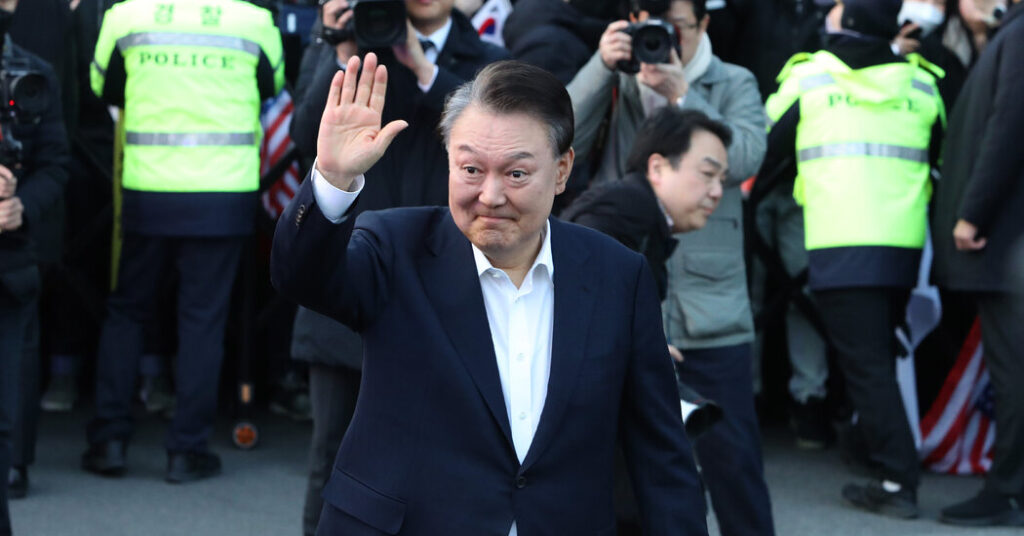Yoon Suk Yeol, the president of South Korea, who was impeached in December over his failed attempt to impose martial law, will learn Friday whether he will be formally removed from office or returned to power, the nation’s top court said Tuesday.
Suspense was building in South Korea as the country waited for the Constitutional Court to rule on Mr. Yoon’s fate. He has been suspended from office since the National Assembly impeached him on Dec. 14. In South Korea, the Constitutional Court decides whether an impeached official is removed permanently from office or reinstated.
Removing Mr. Yoon would require the votes of six or more of the court’s eight justices; otherwise, he will return to office. The court’s decision, which cannot be appealed, is a critical moment in the political upheaval that Mr. Yoon unleashed when he declared martial law on Dec. 3.
If the court removes him, Mr. Yoon will become the second president in South Korean history to leave office through impeachment. (President Park Geun-hye was the first, in 2017.) The country will quickly shift gears toward a new election; a successor must be chosen within 60 days.
If he is reinstated, South Korea’s political crisis is likely to deepen. Mr. Yoon’s attempt to impose martial law angered millions of South Koreans. Even if reinstated, he will resume his presidential duties with his ability to govern considerably weakened.
In a statement, the Constitutional Court said it would convene at 11 a.m. Friday to rule on Mr. Yoon’s case. It said it would allow TV stations to broadcast the ruling live.
Mr. Yoon was detained on Jan. 15 on insurrection charges, also connected to his imposition of martial law. The suspense surrounding his future intensified after a Seoul court unexpectedly released him from jail on March 8, saying his detention was procedurally flawed.
The court’s decision — and the Constitutional Court’s upcoming ruling — do not directly affect the criminal charges, which he has been fighting in a separate trial that began in February.
A decision by the Constitutional Court to reject his parliamentary impeachment would galvanize Mr. Yoon’s supporters, who have held rallies in Seoul in recent weeks, calling the impeachment and the insurrection charge a “fraud” and demanding his return to office.
But it is likely to anger a majority of South Koreans, who want Mr. Yoon to be removed, according to recent surveys. The police have beefed up security measures around the courthouse to guard against violence.
Mr. Yoon unexpectedly declared martial law on Dec. 3, calling the opposition-controlled National Assembly a “monster” and a “den of criminals” that had “paralyzed” his government.
It was the first time in more than four decades that any leader had tried placing South Korea, an important United States ally, under military rule. The Assembly voted the measure down, forcing Mr. Yoon to rescind the order within hours.
But it set off the nation’s worst political crisis in decades. South Koreans, who harbor painful memories of the past military rule, took to the streets by the thousands to call for Mr. Yoon’s ouster.
Holed up with his bodyguards in his fortified residence in central Seoul, Mr. Yoon initially resisted the efforts of criminal investigators to detain him. But he surrendered on Jan. 15, becoming the first president in South Korean history to face criminal charges while still in office.
Prosecutors said that Mr. Yoon committed insurrection during the short-lived imposition of martial law when, they said, he banned all political activities and ordered military commanders to break the Assembly’s doors down “with axes” or “by shooting, if necessary” and “drag out” lawmakers.
They said Mr. Yoon sent the troops to seize the Assembly and detain political leaders. The nation watched live-streamed scenes of special forces troops armed with assault rifles storming the Assembly as lawmakers were gathering there to vote against martial law.
When Mr. Yoon attended hearings at the Constitutional Court in recent weeks, he vehemently rejected the charge of insurrection and said he hoped to regain office. He said he never intended to neutralize the Parliament or gave orders to arrest political leaders. The troops were sent to the Assembly to “keep order,” he said.
In his final argument at the court on Feb. 25, Mr. Yoon said he declared martial law in a “desperate” struggle against the opposition, which he said had ceaselessly undermined his government with its majority power in Parliament.
“Who can say our country is not in a national emergency?” he said, citing President Trump’s decision to declare a national emergency over immigration and send troops to the border with Mexico.
Mr. Yoon said South Korea was overrun with spies from North Korea and China.
Lawyers who argued for his ouster on behalf of the National Assembly said the claims by Mr. Yoon were fallacious. Letting him return to office would be like allowing “a madman to drive the car again,” said one of the lawyers, Song Doo-hwan.
Mr. Yoon’s former defense minister, several military generals and police chiefs are also standing trial on separate criminal charges of helping Mr. Yoon commit insurrection.

